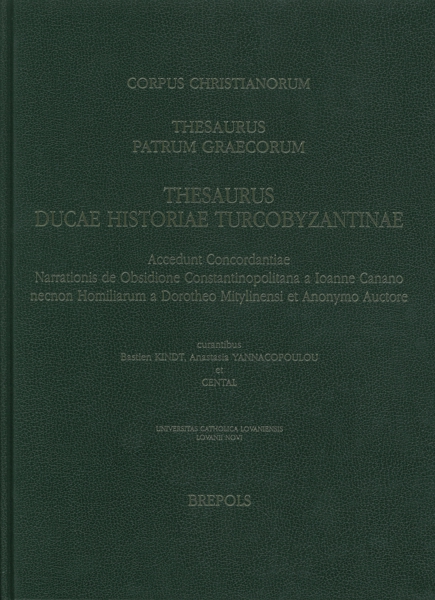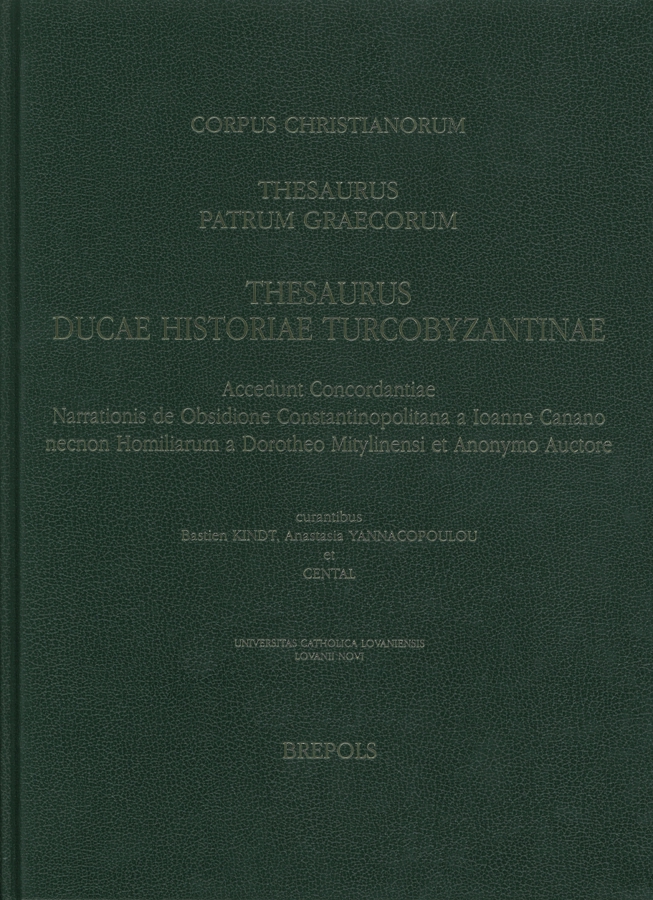
Ducas
Thesaurus Ducae Historiae Turcobyzantinae
Accedunt Concordantiae Narrationis de Obsidione Constantinopolitana a Ioanne Canano necnon Homiliarum a Dorotheo Mitylinensi et Anonymo Auctore
B. Kindt, Anastasia Yannacopoulou (eds)
- Pages: 373 p.
- Size:230 x 315 mm
- Language(s):Greek, French
- Publication Year:2012
- € 345,00 EXCL. VAT RETAIL PRICE
- ISBN: 978-2-503-53421-3
- Hardback
- Available
Four important Byzantine historians have left narrative texts about the expansion of the Ottoman Empire, the gradual disintegration of the Byzantine Empire and the capture of Constantinople by Sultan Meḥemmed II Fatiḥ (1444-1481) in 1453 : Critoboulos from Imbros, Laonicos Chalcocondyles, Georgios Phrantzes and Dukas. This new Thesaurus, the twenty-fourth of the collection, is devoted to the analysis of the lexicon of the latter. The Historia Turcobyzantina by Dukas, described by B. Flusin as «a parallel history of the Palaiologoi and the Ottomans, until the disappearance, already accomplished, of the former and the announced end of the latter» is a text often used by modern historians, but it is not yet studied enough for itself. Dukas uses a mixed Greek language : the author is a scholar, but not a purist, and his lexicon contains many loanwords from languages spoken by peoples living in the Mediterranean world during the fourteenth and fifteenth centuries. The thesaurus follows the edition of V. Grecu wich was published in 1958. The concordance and the lexicographical tools developed for this collection are accompanied by an index of loanwords coming from Turkish, Arabic, Persian, Latin and Romance languages. The authors received the kind assistance of Professor Sophia Kotzabassi who is preparing a new edition of Dukas expected to be published in the Corpus Fontium Historiae Byzantinae. As the title suggests, this volume also explores the lexicon of three other texts, minor works which are not long enough to create a thesaurus, if they are studied individually : i) an anonymous account of the siege of Constantinople by Bāyazīd I between 1394-1402, edited by P. Gautier in 1965 (= BHG 1063z) ; ii) a narratio of the siege of Constantinople led by Sultan Murād II in 1422 written by Jean Cananos, published by E. Pinto in 1977 (BHG 1064) ; iii) the didascalia of Dorothy, Archbishop of Mitylene, addressed to the inhabitants of Constantinople during this attack and published by Chr. Loparev in 1906.
Bastien Kindt is preparing a PhD at the Oriental Institute of the Catholic University of Louvain (Louvain-la-Neuve, Belgium). He is the author of several volumes of the T.P.G. His research focuses on the automatic processing of ancient Greek, mostly on problems of lemmatization and tagging of corpus. For more information, visit the website of the Projet de recherche en lexicologie grecque at http://tpg.fltr.ucl.ac.be.
Anastasia Yannacopoulou has a PhD in Computational Linguistics from the University of Paris-Est Marne-la-Vallée (Paris, France). Her research focuses on the morphological analysis and the flexional particularities of Katharevousa and Demotic Greek, and on the syntactical analysis of Modern Greek in Natural Language Processing systems. She works on the creation and the maintenance of voluminous electronic dictionaries in different languages, based on big corpora. She is co-founder of Ergonotics SAS (Lille, France).
Quatre historiens byzantins nous ont laissé d’importants témoignages sur l’expansion de l’Empire ottoman, la désagrégation progressive de l’Empire byzantin et la prise de Constantinople par le Sultan Meḥemmed II Fatiḥ (1444-1481) en 1453 : Critoboulos d’Imbros, Laonicos Chalcocondylis, Georgios Phrantzes et Ducas. Ce nouveau Thesaurus, le vingt-quatrième de la collection, se consacre à l’analyse du lexique de ce dernier. L’Historia Turco-byzantina de Doucas, décrite par B. Flusin comme « une histoire parallèle des Paléologues et des Ottomans, jusqu’à la disparition déjà vécue des uns, et à la fin annoncée des autres » est un texte souvent exploité par les historiens, mais encore trop peu étudié pour lui-même. Sa langue est mixte : l’auteur est un lettré, mais pas un puriste, et son lexique contient de nombreux mots empruntés aux langues des peuples en présence dans l’univers méditerranéen des xive et xve s.
Le texte suivi est celui de l’édition de V. Grecu publié en 1958. La concordance et les outils lexicographiques propres à la collection sont accompagnés d’un index des mots empruntés au turc, à l’arabe, au persan, au latin et aux langues romanes. Les auteurs ont été accompagnés dans leur entreprise par le Professeur Sophia Kotzabassi qui prépare une nouvelle édition de Doucas pour le Corpus Fontium Historiae Byzantinae. Comme le titre l’indique, ce volume explore également le lexique de trois autres textes, œuvres mineures qui, prises individuellement, ne pourraient faire l’objet d’un thesaurus : i) un récit anonyme du blocus de Constantinople imposé par Bāyazīd I entre 1394-1402, édité par P. Gautier en 1965 (= B.H.G. 1063z) ; ii) une narratio du siège de Constantinople mené par le Sultan Murād II en 1422 rédigé par Jean Cananos, publié par E. Pinto en 1977 (B.H.G. 1064) ; iii) une didascalie de Dorothée, archevêque de Mitylène, adressée aux habitants de Constantinople durant ce même siège et publiée par Chr. Loparev en 1906.
Bastien Kindt, doctorand à l'Institut orientaliste de l'Université catholique de Louvain (Louvain-la-Neuve, Belgique), a participé à l’élaboration de plusieurs volumes du T.P.G. Ses travaux portent sur le traitement automatique du grec ancien, principalement sur les problèmes de lemmatisation et d’annotation de corpus. Pour tout renseignement, consulter le site Internet du Projet de recherche en lexicologie grecque à l’adresse http://tpg.fltr.ucl.ac.be.
Anastasia Yannacopoulou est Docteur en informatique linguistique de l’Université Paris-Est Marne-la-Vallée (Paris, France). Sa recherche porte sur l’analyse morphologique et les particularités flexionnelles de la langue savante et de la langue populaire, ainsi que sur l’analyse syntaxique du grec moderne dans des systèmes de traitement automatique des langues. Elle travaille à la création et à la gestion de dictionnaires électroniques volumineux en plusieurs langues, à partir de grands corpus. Actuellement, elle est co-fondatrice d’Ergonotics SAS (Lille, France).





